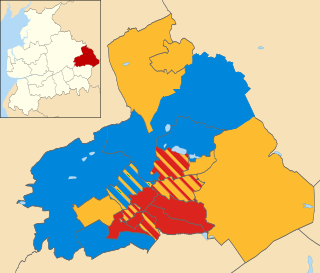
The borough of Redcar & Cleveland is a unitary authority area in the North East of England within the ceremonial county of North Yorkshire. The main settlements consists of Redcar, Saltburn-by-the-Sea, Guisborough, and small towns such as Brotton, Eston, Skelton and Loftus. It had a resident population of 135,200 in 2011.

Redcar is a constituency represented in the House of Commons of the UK Parliament since 2019 by Jacob Young, a Conservative.

Middlesbrough South and East Cleveland is a constituency created in 1997 represented in the House of Commons of the UK Parliament since 2017 by Simon Clarke of the Conservative Party. The local electorate returned a Labour MP in the seat's first five general elections; in the following election Clarke became its first Conservative MP.

Teesville is an area of Middlesbrough in the north east of England and is part of the unitary authority of Redcar and Cleveland and in the ceremonial county of North Yorkshire. It has a population of approximately 7,000 residents. It is between South Bank and the River Tees, to the north, and Normanby, Eston and the Eston Hills, commanding an excellent view of the monument at Eston Nab, to the south.
Middlesbrough is a unitary authority in North Yorkshire, England. Until 1 April 1996 it was a non-metropolitan district in Cleveland. Since 2002 it has also had a directly elected mayor.
Elections to Hartlepool Borough Council in the ceremonial county of County Durham in England were held on 6 May 1999. One third of the council was up for election and the Labour party stayed in overall control of the council. The results saw the Labour party lose two seats to the Liberal Democrats and one seat to the Conservative party. Overall turnout in the election was 26.1%.
Redcar and Cleveland is a unitary authority in North Yorkshire, England. Until 1 April 1996 it was a non-metropolitan district in Cleveland.
Thanet District Council in Kent, England is elected every four years.
The 1999 South Tyneside Metropolitan Borough Council election took place on 6 May 1999 to elect members of South Tyneside Metropolitan Borough Council in Tyne and Wear, England. One third of the council was up for election and the Labour party kept overall control of the council.
The 2003 Rushmoor Council election took place on 1 May 2003 to elect members of Rushmoor Borough Council in Hampshire, England. One third of the council was up for election and the Conservative party stayed in overall control of the council.
The 1999 Sunderland Council election took place on 6 May 1999 to elect members of Sunderland Metropolitan Borough Council in Tyne and Wear, England. One third of the council was up for election and the Labour party stayed in overall control of the council.
The 2002 Harrogate Council election took place on 2 May 2002 to elect members of Harrogate Borough Council in North Yorkshire, England. The whole council was up for election with boundary changes since the last election in 2000 reducing the number of seats by 5. The Liberal Democrats lost overall control of the council to no overall control.
The 2003 Harrogate Council election took place on 1 May 2003 to elect members of Harrogate Borough Council in North Yorkshire, England. One third of the council was up for election and the council stayed under no overall control.

The 2002 Pendle Borough Council election took place on 2 May 2002 to elect members of Pendle Borough Council in Lancashire, England. The whole council was up for election with boundary changes since the last election in 2000 reducing the number of seats by 2. The council stayed under no overall control.
The 2002 Basingstoke and Deane Council election took place on 2 May 2002 to elect members of Basingstoke and Deane Borough Council in Hampshire, England. The whole council was up for election with boundary changes since the last election in 2000 increasing the number of seats by 3. The council stayed under no overall control.
The 2003 Basingstoke and Deane Council election took place on 1 May 2003 to elect members of Basingstoke and Deane Borough Council in Hampshire, England. One third of the council was up for election and the council stayed under no overall control.

The 2008 Basingstoke and Deane Council election took place on 1 May 2008 to elect members of Basingstoke and Deane Borough Council in Hampshire, England. The whole council was up for election with boundary changes since the 2007 election. The Conservative party gained overall control of the council from no overall control.

The 2003 Gedling Borough Council election took place on 1 May 2003 to elect members of Gedling Borough Council in Nottinghamshire, England. The whole council was up for election with boundary changes since the last election in 1999 reducing the number of seats by 7. The Conservative party lost overall control of the council to no overall control.
The 1999 Redcar and Cleveland Borough Council election took place on 6 May 1999 to elect members of Redcar and Cleveland Unitary Council in England. The whole council was up for election and the Labour party stayed in overall control of the council.

The 2007 Redcar and Cleveland Borough Council election took place on 3 May 2007 to elect members of Redcar and Cleveland Unitary Council in England. The whole council was up for election and the council stayed under no overall control.








